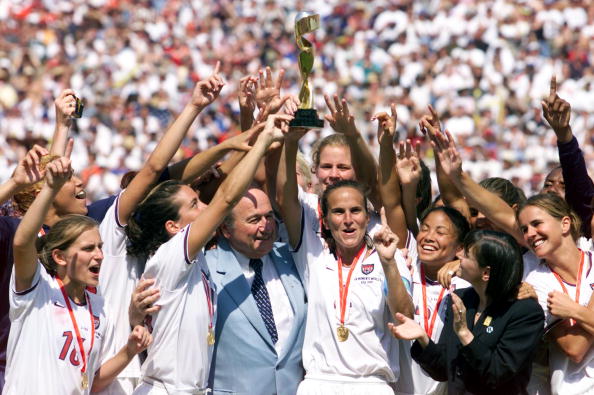By Paul Nicholson
June 6 – The dispute between the world beating US Women’s national team and the US Soccer Federation over the women’s demands for equal pay for representing their country – they generally earn between 62% and 25% less per match than their male counterparts – took a controversial turn in a Chicago court when a judge ruled they could not take strike action.
It had been rumoured that the women’s team might boycott the Rio Olympics over the pay dispute. They will start as red hot favourites for the tournament and gold medal in what is a big summer of soccer for the US federations as it attempts to show it has more to contribute to world football than FBI informants and a Justice Department arresting football officials in the Americas.
But on hearing the rumour of strike action the US Soccer Federation (USSF) moved swiftly to prevent it, filing suit claiming that they had a pre-existing agreement with the players’ union and the national team that carried a no-strike clause. The Chicago judge ruled in favour of the USSF.
The original agreement with the players had ended in 2012 but the USSF argued that it had been extended to 2016 and didn’t expire until after the Rio games.
The players’ representatives argued that the extension from 2013 to 2016 was never a valid contract as it had been done between the lawyers of both sides and not involved the players’ directly.
The ruling releases a potentially huge pressure point on the federation to resolve the pay dispute swiftly, effectively meaning the players will still have to play the Rio Olympics under the old terms and reducing their bargaining position.
The players already have a complaint filed with the Equal Opportunities Commission in the US which is on-going.
Rich Nichols, a representative for the players union, said: “The court’s ruling today does not negate the fact that US Soccer does not fairly compensate the Women’s National Team, or in any way impact the players’ demands for equal pay for equal work. We respect the judge’s decision and naturally, the members of the USWNT look forward to representing the USA in the Olympic Games.”
Doubtless he would similarly like the USSF to respect the principle of gender equality in the male run and dominated federation.
The women’s argument centres around the disparity in match fees paid to them compared to their male counterparts. As part of their argument they point to the $16 million profit the USSF made from the women’s team in comparison to the losses the USSF made on running its men’s team. The US is probably unique in world football as being the only country where the women’s national team could be deemed to be supporting the men’s.
Male players can earn up to $17,625 for an exhibition match against a top nation and are guaranteed no less than $5,000 even if the team loses. In contrast the maximum a female player can be paid is $4,950, even if they win.
The dispute has not originated from a new complaint from the women who it has been argued should be claiming to be earning more than the men because of their higher success and greater profitability.
“We have been quite patient over the years with the belief that the federation would do the right thing and compensate us fairly,” said Carli Lloyd. One of the five US team captains (alongside Alex Morgan, Megan Rapinoe, Becky Sauerbrunn, and Hope Solo) who filed the complaint against the USSF.
“Recently, it has become clear that the Federation has no intention of providing us equal pay for equal work,” said Rapinoe.
Contact the writer of this story at moc.l1714472353labto1714472353ofdlr1714472353owedi1714472353sni@n1714472353osloh1714472353cin.l1714472353uap1714472353

